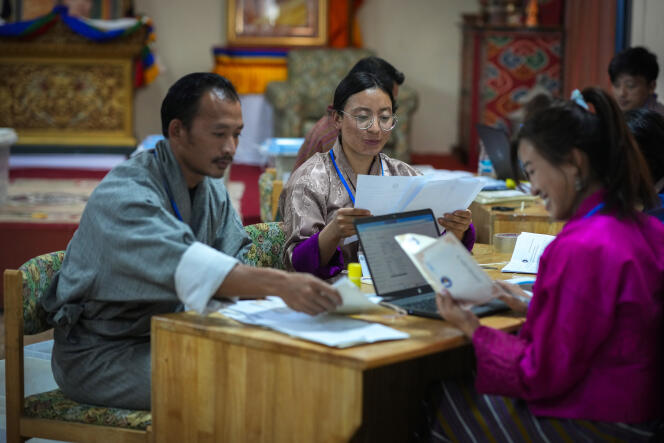


The Kingdom of Bhutan, whose voters were called to the polls on Tuesday, January 9 to elect their members of parliament, could be facing a turning point in its history. One of the few countries on the planet with a negative carbon footprint, the small Himalayan country of 780,000, which invented the concept of "gross national happiness" in a rejection of a "growth-at-all-costs" mentality, urgently needs to galvanize its economy. Youth unemployment has reached nearly 30%.
The country's lifeblood – young people, civil servants, teachers and nurses – is fleeing to Australia, Canada, the Gulf States and Japan in search of attractive jobs and better living conditions. More than 15,000 Bhutanese have obtained visas to go abroad in 2023. As a result, labor shortages are being felt in all sectors.
Economic issues dominated the campaigns for the parliamentary elections, the fourth since the transition from an absolute to a parliamentary monarchy in 2008. Isolated and wedged between China and India, the country is still suffering from the repercussions of the Covid-19 pandemic, which was managed in an exemplary manner from a public health point of view (only around 20 people died), but which caused a decline in tourism, which is vital for Bhutan, due to the strictness of its lockdowns. Most of the country's income comes from the production of hydroelectricity and tourism. Visitors must pay a daily tourist fee of €100 for the right to visit this precious treasure.
The population, particularly in urban areas, is suffering from rising prices for fuel and essential goods, which were already very expensive to begin with, as Bhutan is dependent on imports. "The year 2022 was marked by a deep despondency among the population in the face of deteriorating purchasing power from Covid-19. There is no shortage of manual jobs – 50,000 Indians work in Bhutan – but young Bhutanese aspire to skilled jobs," observed Françoise Pommaret, a Bhutan specialist and an honorary consul for France in Bhutan.
Debates between the election candidates focused on recovery strategies. In a recent report, the Asian Development Bank said that Bhutan needs to promote its private sector more if it is to achieve its goal of a gross domestic product (GDP) of $10 billion (€9.1 billion) by 2034, up from $2.6 billion today. Regulatory obstacles are numerous.
Although he did not get involved in the campaigns, Jigme Khesar Namgyel Wangchuck, the king of Bhutan, unveiled an unprecedented development project on Bhutan's National Day (December 17) in 2023. Although this project is designed to generate economic growth, the king insisted that it is in line with the philosophy of "gross national happiness," created by his father as an alternative indicator for measuring a country's progress. In Gelephu, on the border with India, the first carbon-neutral economic zone is to be created: a "Mindfulness City."
You have 40% of this article left to read. The rest is for subscribers only.
